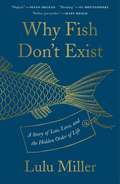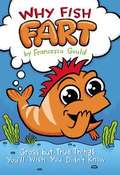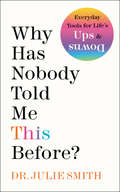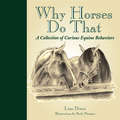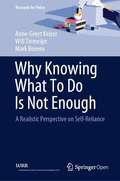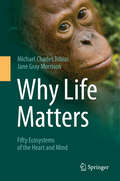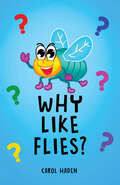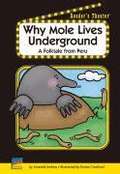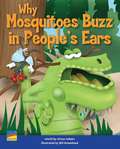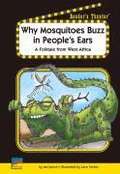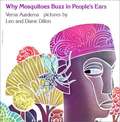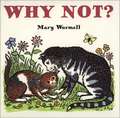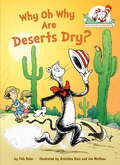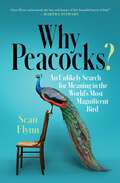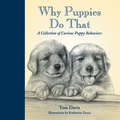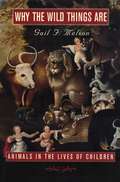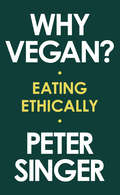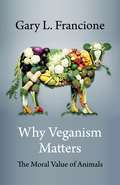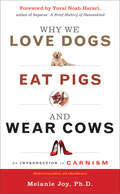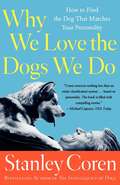- Table View
- List View
Why Fish Don't Exist: A Story of Loss, Love, and the Hidden Order of Life
by Lulu MillerA wondrous debut from an extraordinary new voice in nonfiction, Why Fish Don&’t Exist is a dark and astonishing tale of love, chaos, scientific obsession, and—possibly—even murder. David Starr Jordan was a taxonomist, a man possessed with bringing order to the natural world. In time, he would be credited with discovering nearly a fifth of the fish known to humans in his day. But the more of the hidden blueprint of life he uncovered, the harder the universe seemed to try to thwart him. His specimen collections were demolished by lightning, by fire, and eventually by the 1906 San Francisco earthquake—which sent more than a thousand of his discoveries, housed in fragile glass jars, plummeting to the floor. In an instant, his life&’s work was shattered. Many might have given up, given in to despair. But Jordan? He surveyed the wreckage at his feet, found the first fish he recognized, and confidently began to rebuild his collection. And this time, he introduced one clever innovation that he believed would at last protect his work against the chaos of the world. When NPR reporter Lulu Miller first heard this anecdote in passing, she took Jordan for a fool—a cautionary tale in hubris, or denial. But as her own life slowly unraveled, she began to wonder about him. Perhaps instead he was a model for how to go on when all seemed lost. What she would unearth about his life would transform her understanding of history, morality, and the world beneath her feet. Part biography, part memoir, part scientific adventure, Why Fish Don&’t Exist reads like a fable about how to persevere in a world where chaos will always prevail.
Why Fish Fart
by Francesca Gould Jp CoovertGet ready to squeal! Have you ever wondered: How many pounds of insect parts the average person eats each year? Which specialty coffee is made from poop? How someone turned farting into a job? No? Then don't open this book. The world around you is pretty wonderful, but also extremely weird.
Why Frogs Are Wet
by Judy Hawes Mary Ann FraserFrogs can jump thirty times their own body length, catch insects on the wing, and breathe underwater or on land. But they must always keep their skins wet. Read and find out why!
Why Frogs Are Wet (Let's-Read-and-Find-Out Science 2)
by Judy HawesRead and find out about frogs in this colorfully illustrated nonfiction picture book.Frogs can jump thirty times their own body length, catch insects on the wing, and breathe underwater or on land. But they must always keep their skins wet. Read and find out why! This is a clear and appealing science book for early elementary age kids, both at home and in the classroom. It's a Level 2 Let's-Read-and-Find-Out, which means the book explores more challenging concepts for children in the primary grades. The 100+ titles in this leading nonfiction series are:hands-on and visualacclaimed and trustedgreat for classroomsTop 10 reasons to love LRFOs:Entertain and educate at the same timeHave appealing, child-centered topicsDevelopmentally appropriate for emerging readersFocused; answering questions instead of using survey approachEmploy engaging picture book quality illustrationsUse simple charts and graphics to improve visual literacy skillsFeature hands-on activities to engage young scientistsMeet national science education standardsWritten/illustrated by award-winning authors/illustrators & vetted by an expert in the fieldOver 130 titles in print, meeting a wide range of kids' scientific interestsBooks in this series support the Common Core Learning Standards, Next Generation Science Standards, and the Science, Technology, Engineering, and Math (STEM) standards. Let's-Read-and-Find-Out is the winner of the American Association for the Advancement of Science/Subaru Science Books & Films Prize for Outstanding Science Series.
Why Has Nobody Told Me This Before?
by Dr. Julie SmithOver 1 million copies sold worldwide!International Bestseller“Smart, insightful, and warm. Dr. Julie is both the expert and wise friend we all need.”—Lori Gottlieb, New York Times bestselling author of Maybe You Should Talk to Someone and co-host of the Dear Therapists podcastDrawing on years of experience as a clinical psychologist, online sensation Dr Julie Smith provides the skills you need to navigate common life challenges and take charge of your emotional and mental health in her debut book.Filled with secrets from a therapist's toolkit, Why Has Nobody Told Me This Before teaches you how to fortify and maintain your mental health, even in the most trying of times. Dr Julie Smith’s expert advice and powerful coping techniques will help you stay resilient, whether you want to manage anxiety, deal with criticism, cope with depression, build self-confidence, find motivation, or learn to forgive yourself. Why Has Nobody Told Me This Before tackles everyday issues and offers practical solutions in bite-sized, easy-to-digest entries which make it easy to quickly find specific information and guidance. Your mental well-being is just as important as your physical well-being. Packed with proven strategies, Dr. Julie’s empathetic guide offers a deeper understanding of how your mind works and gives you the insights and help you need to nurture your mental health every day. Wise and practical, Why Has Nobody Told Me This Before might just change your life.
Why Horses Do That
by Lisa DinesWhy do horses "spook" at things? Why do horses kick if approached from the rear? Why do horses sleep standing up? Why do horses breathe into each other's nostrils?These and 36 other curious equine behaviors are informatively and lightheartedly answered in the handsomely illustrated "Why Horses Do That."An original pencil drawing illustrates each insightful explanation of odd but characteristic horse actions.
Why Knowing What To Do Is Not Enough: A Realistic Perspective on Self-Reliance (Research for Policy)
by Anne-Greet Keizer Will Tiemeijer Mark BovensThis open access book sets out to explain the reasons for the gap between “knowing” and “doing” in view of self-reliance, which is more and more often expected of citizens. In today’s society, people are expected to take responsibility for their own lives and be self-reliant. This is no easy feat. They must be on constant high alert in areas of life such as health, work and personal finances and, if things threaten to go awry, take appropriate action without further ado. What does this mean for public policy? Policymakers tend to assume that the government only needs to provide people with clear information and that, once properly informed, they will automatically do the right thing. However, it is becoming increasingly obvious that things do not work like that. Even though people know perfectly well what they ought to do, they often behave differently. Why is this? This book sets out to explain the reasons for the gap between ‘knowing’ and ‘doing’. It focuses on the role of non-cognitive capacities, such as setting goals, taking action, persevering and coping with setbacks, and shows how these capacities are undermined by adverse circumstances. By taking the latest psychological insights fully into account, this book presents a more realist perspective on self-reliance, and shows government officials how to design rules and institutions that allow for the natural limitations in people’s ‘capacity to act’.
Why Life Matters
by Michael Charles Tobias Jane Gray MorrisonDr. Michael Charles Tobias and Jane Gray Morrison are world-renowned ecological philosophers and activists, interdisciplinary social and environmental scientists and broad-ranging, deeply committed humanists. This collection of fifty essays and interviews comprises an invigorating, outspoken, provocative and eloquent overview of the ecological humanities in one highly accessible volume. The components of this collection were published in the authors' "Green Conversations" blog series, and pieces in the Eco News Network from 2011 to 2013 and feature luminaries from Jane Goodall to Ted Turner to the Secretary of the Smithsonian Institution to the former head of the UN Convention on Biological Diversity. Stunning color photographs captured by the authors and contributors make Why Life Matters: Fifty Ecosystems of the Heart and Mind a feast for the eyes as well as the mind and soul. Ethics, science, technology, ecological literacy, grass-roots renaissance thinkers, conservation innovation from the U. S. to the U. K. ; from India to Ecuador; from Bhutan to Haiti; from across Africa, the Neo-Tropics, Central Asia and Japan, to Rio, Shanghai and Manhattan - this humanistic ode to the future of life on earth is a relevant and resonating read. Michael Tobias and Jane Gray Morrison, partners who between them have authored some 50 books and written, directed and produced some 170 films, a prolific body of work that has been read, translated and/or broadcast around the world, have been married for more than a quarter-of-a-century. Their field research across the disciplines of comparative literature, anthropology, the history of science and philosophy, ecology and ethics, in over 80 countries, has served as a telling example of what two people - deeply in love with one another - can accomplish in spreading that same unconditional love to others - of all species.
Why Like Flies?
by Carol HadenStep into a world where the unappealing becomes fascinating and the misunderstood finds a voice. Join Flyboy on a transformative journey as he uncovers the hidden truths behind creatures often deemed unsightly or fearsome. Through his encounters with much-maligned allies, Flyboy challenges the notion that first impressions tell the whole story. As he delves into the lives of flies and other oft-maligned creatures, Flyboy discovers a wealth of positive attributes and captivating facts that challenge preconceived notions. This enlightening tale encourages readers to approach the unknown with an open mind, embracing curiosity and the potential for newfound appreciation.
Why Living Things Need… Homes (Into Reading Texas, Read Aloud Module 9 #1)
by Daniel NunnNIMAC-sourced textbook
Why Mole Lives Underground: A Folktale from Peru
by Jeffrey Fuerst Amanda Jenkins Emma CrawfordPerform this folktale from Peru about how hard work makes dreams come true.
Why Mosquitoes Buzz in People's Ears
by Bill Greenhead Alison Adams Sera Y. ReycraftClassic Tales: Why Mosquitoes Buzz in People's Ears
Why Mosquitoes Buzz in People's Ears
by Bill Greenhead Alison Adams Sera Y. ReycraftClassic Tales: Why Mosquitoes Buzz in People's Ears
Why Mosquitoes Buzz in People's Ears: A folktale From Africa
by Jeffrey Fuerst Ian James Lane YerkesPerform this folktale from Africa about a fast–talking mosquito. (Set of 12 with Teacher's Guide)
Why Mosquitoes Buzz in People’s Ears: A West African Tale
by Verna Aardema Leo Dillon Diane DillonNIMAC-sourced textbook
Why Not?
by Mary Wormwell"Don't chase the chickens, Barnaby!" "WHY NOT?" Barnaby is a mischievous kitten who's made it his mission to chase and scare and annoy all the animals on the farm, despite his mother's scolding. And when the farm animals threaten to chase and scare and annoy Barnaby back, he always finds a means of escape--at least, until he gets himself into a very tight situation.
Why Oh Why Are Deserts Dry? All About Deserts: All About Deserts (The Cat in the Hat's Learning Library)
by Tish RabeLaugh and learn with fun facts about desert animals, cacti, sand dunes, and more—all told in Dr. Seuss&’s beloved rhyming style and starring the Cat in the Hat! &“You may think that deserts are empty and bare, but you&’ll be surprised by the things we&’ll find there...&” The Cat in the Hat&’s Learning Library series combines beloved characters, engaging rhymes, and Seussian illustrations to introduce children to non-fiction topics from the real world! Journey through the deserts of the world and learn: how plants and animals have adapted to survive the unforgiving climatewhy deserts don&’t have to be hotwhat causes us to see miragesand much more! Perfect for story time and for the youngest readers, Why Oh Why Are Deserts Dry? All About Deserts also includes an index, glossary, and suggestions for further learning.Look for more books in the Cat in the Hat&’s Learning Library series!Cows Can Moo! Can You? All About FarmsHark! A Shark! All About SharksIf I Ran the Dog Show: All About DogsOh Say Can You Say Di-no-saur? All About DinosaursOn Beyond Bugs! All About InsectsOne Vote Two Votes I Vote You VoteThere&’s No Place Like Space: All About Our Solar SystemWho Hatches the Egg? All About EggsWish for a Fish: All About Sea Creatures
Why Peacocks?: An Unlikely Search for Meaning in the World's Most Magnificent Bird
by Sean FlynnAn acclaimed journalist seeks to understand the mysterious allure of peacocks—and in the process discovers unexpected and valuable life lessons.When Sean Flynn&’s neighbor in North Carolina texted &“Any chance you guys want a peacock? No kidding!&” he stared bewilderedly at his phone. He had never considered whether he wanted a peacock. But as an award-winning magazine writer, this kind of mystery intrigued him. So he, his wife, and their two young sons became the owners of not one but three charming yet fickle birds: Carl, Ethel, and Mr. Pickle. In Why Peacocks?, Flynn chronicles his hilarious and heartwarming first year as a peacock owner, from struggling to build a pen to assisting the local bird doctor in surgery to triumphantly watching a peahen lay her first egg. He also examines the history of peacocks, from their appearance in the Garden of Eden to their befuddling Charles Darwin to their bewitching the likes of Flannery O&’Connor and Martha Stewart. And fueled by a reporter&’s curiosity, he travels across the globe to learn more about the birds firsthand, with stops including a Scottish castle where peacocks have resided for centuries, a southern California community tormented by a serial killer of peacocks, and a Kansas City airport hotel hosting an annual gathering of true peafowl aficionados. At turns comically absurd and deeply poignant, Why Peacocks? blends lively, insightful memoir and illuminating science journalism to answer the title&’s question. More than that, it offers surprising lessons about love, grief, fatherhood, and family.
Why Puppies Do That
by Tom DavisWhy do puppies sometimes lie on their backs when approached? Why do they sleep in a pile? Why do puppies have that special puppy smell? Why are some puppies runts?Few things can cause as much head scratching as the peculiar behavior and characteristics of a new puppy, and this book aims to answer all of the questions new dog owners wonder about their new little charge.Illustrated with pencil drawings, Why Puppies Do That is lighthearted, informative, and as fun as a new puppy.
Why The Wild Things Are: Animals In The Lives Of Children
by Gail F. MelsonWhether they see themselves as King of the Wild Things or protector of Toto, children live in a world filled with animals--both real and imaginary. From Black Beauty to Barney, animal characters romp through children's books, cartoons, videos, and computer games. <p><p>As Gail Melson tells us, more than three-quarters of all children in America live with pets and are now more likely to grow up with a pet than with both parents. She explores not only the therapeutic power of pet-owning for children with emotional or physical handicaps but also the ways in which zoo and farm animals, and even certain purple television characters, become confidants or teachers for children--and sometimes, tragically, their victims. <p><p> Yet perhaps because animals are ubiquitous, what they really mean to children, for better and for worse, has been unexplored territory. Why the Wild Things Are is the first book to examine children's many connections to animals and to explore their developmental significance. What does it mean that children's earliest dreams are of animals? What is the unique gift that a puppy can give to a boy? <p><p>Drawing on psychological research, history, and children's media, Why the Wild Things Are explores the growth of the human-animal connection. In chapters on children's emotional ties to their pets, the cognitive challenges of animal contacts, animal symbols as building blocks of the self, and pointless cruelty to animals, Melson shows how children's innate interest in animals is shaped by their families and their social worlds, and may in turn shape the kind of people they will become.
Why Vegan?: Eating Ethically (Penguin Great Ideas Ser.)
by Peter SingerIn a world reeling from a global pandemic, never has a treatise on veganism—from our foremost philosopher on animal rights—been more relevant or necessary. “Peter Singer may be the most controversial philosopher alive; he is certainly among the most influential.” —The New Yorker Even before the publication of his seminal Animal Liberation in 1975, Peter Singer, one of the greatest moral philosophers of our time, unflinchingly challenged the ethics of eating animals. Now, in Why Vegan?, Singer brings together the most consequential essays of his career to make this devastating case against our failure to confront what we are doing to animals, to public health, and to our planet. From his 1973 manifesto for Animal Liberation to his personal account of becoming a vegetarian in “The Oxford Vegetarians” and to investigating the impact of meat on global warming, Singer traces the historical arc of the animal rights, vegetarian, and vegan movements from their embryonic days to today, when climate change and global pandemics threaten the very existence of humans and animals alike. In his introduction and in “The Two Dark Sides of COVID-19,” cowritten with Paola Cavalieri, Singer excoriates the appalling health hazards of Chinese wet markets—where thousands of animals endure almost endless brutality and suffering—but also reminds westerners that they cannot blame China alone without also acknowledging the perils of our own factory farms, where unimaginably overcrowded sheds create the ideal environment for viruses to mutate and multiply. Spanning more than five decades of writing on the systemic mistreatment of animals, Why Vegan? features a topical new introduction, along with nine other essays, including: • “An Ethical Way of Treating Chickens?,” which opens our eyes to the lives of the birds who end up on so many plates—and to the lives of their parents; • “If Fish Could Scream,” an essay exposing the utter indifference of commercial fishing practices to the experiences of the sentient beings they scoop from the oceans in such unimaginably vast numbers; • “The Case for Going Vegan,” in which Singer assembles his most powerful case for boycotting the animal production industry; • And most recently, in the introduction to this book and in “The Two Dark Sides of COVID-19,” Singer points to a new reason for avoiding meat: the role eating animals has played, and will play, in pandemics past, present, and future. Written in Singer’s pellucid prose, Why Vegan? asserts that human tyranny over animals is a wrong comparable to racism and sexism. The book ultimately becomes an urgent call to reframe our lives in order to redeem ourselves and alter the calamitous trajectory of our imperiled planet.
Why Veganism Matters: The Moral Value of Animals (Critical Perspectives on Animals: Theory, Culture, Science, and Law)
by Gary FrancioneMost people care about animals, but only a tiny fraction are vegan. The rest often think of veganism as an extreme position. They certainly do not believe that they have a moral obligation to become vegan.Gary L. Francione—the leading and most provocative scholar of animal rights theory and law—demonstrates that veganism is a moral imperative and a matter of justice. He shows that there is a contradiction in thinking that animals matter morally if one is also not vegan, and he explains why this belief should logically lead all who hold it to veganism. Francione dismantles the conventional wisdom that it is acceptable to use and kill animals as long as we do so “humanely.” He argues that if animals matter morally, they must have the right not to be used as property. That means that we cannot eat them, wear them, use them, or otherwise treat them as resources or commodities.Why Veganism Matters presents the case for the personhood of nonhuman animals and for veganism in a clear and accessible way that does not require any philosophical or legal background. This book offers a persuasive and powerful argument for all readers who care about animals but are not sure whether they have a moral obligation to be vegan.
Why We Love Dogs, Eat Pigs, and Wear Cows: An Introduction to Carnism
by Melanie Joy&“An absorbing examination of why humans feel affection and compassion for certain animals but are callous to the suffering of others.&” —Publishers WeeklyWhy We Love Dogs, Eat Pigs, and Wear Cows offers an absorbing look at what social psychologist Melanie Joy calls carnism, the belief system that conditions us to eat certain animals when we would never dream of eating others. Carnism causes extensive animal suffering and global injustice, and it drives us to act against our own interests and the interests of others without fully realizing what we are doing. Becoming aware of what carnism is and how it functions is vital to personal empowerment and social transformation, as it enables us to make our food choices more freely—because without awareness, there is no free choice. &“An important and groundbreaking contribution to the struggle for the welfare of animals.&” —Yuval Harari, New York Times–bestselling author &“An exposé of the ideas, prejudices, and numbing of men and women who block out the unsavory details of what is involved in the creation and consumption of animal-based foods.&” —Spirituality & Practice &“With eloquence and humility, Melanie Joy appeals to the values that all of us already have and have always had. She reminds us of who we are.&” —Jonathan Safran Foer, New York Times–bestselling author &“Melanie Joy examines the psychological props that make it possible for us to adore some animals and eat others—and kicks them all aside.&” —Peter Singer, professor of bioethics at Princeton University and author of Animal Liberation Now
Why We Love The Dogs We Do: How To Find The Dog That Matches Your Personality (Basic Ser.)
by Stanley CorenFor anyone who has worried that being beguiled by puppy love might lead only to a short-lived dalliance, Stanley Coren provides the ultimate matchmaking service. Combining his expertise in human psychology and animal behaviour with the research of other animal experts, Coren classifies dogs according to such personality traits as friendliness, protectiveness, and steadiness. To discover which dogs will suit them best, readers take simple personality tests that reveal what they are looking for in a relationship. Extroverted men, for example, may be surprised to find that poodles make the ideal companions; shy women are likely to prefer the company of a bulldog; and men lacking trust might consider an independent Shar-Pei. Stories about people and their four-legged best friends - and a gallery of photographs - capture the special dynamics between couples ranging from Freud and his Chow-Chow to Picasso and his Afghan hound.
